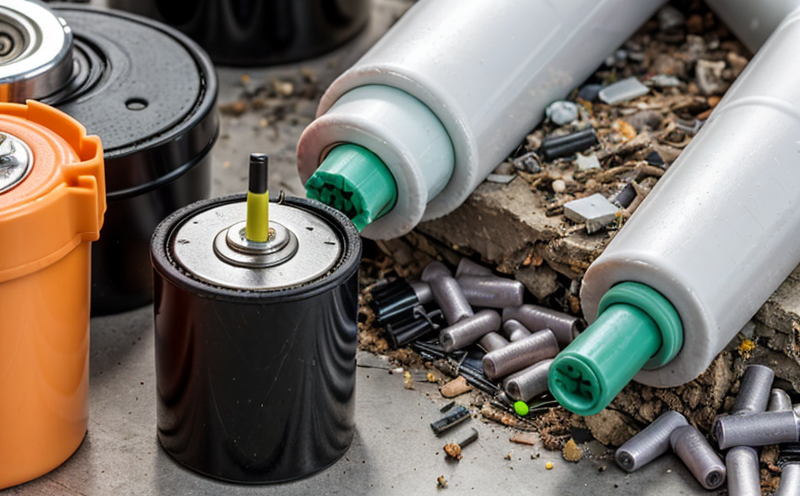IEC 63218 End-of-Life and Recycling Testing of Lithium-Ion Batteries for Aerospace Applications
The IEC (International Electrotechnical Commission) standard IEC 63218 provides comprehensive guidelines on the end-of-life testing and recycling processes of lithium-ion batteries. This standard is especially critical in aerospace applications, where reliability and safety are paramount. Lithium-ion batteries have become indispensable for various aerospace systems such as avionics, communication equipment, and propulsion units due to their high energy density.
In aerospace, the lifecycle of a battery involves several stages including manufacturing, use, end-of-life (EOL), and recycling. The EOL phase is crucial because it ensures that batteries are handled in an environmentally responsible manner while also safeguarding against potential hazards. IEC 63218 focuses on testing lithium-ion batteries to ensure they meet stringent performance criteria before being recycled or disposed of.
The standard covers a range of tests, including:
- Physical and chemical assessments
- Leakage and pressure testing
- Electrical performance checks
- Metal content analysis for recycling purposes
The aim is to ensure that batteries are safe for disposal or reuse. This includes verifying the integrity of the battery casing, checking for leaks which could lead to hazardous materials escaping into the environment, and ensuring that the electrical performance remains within acceptable limits.
Our laboratory adheres strictly to IEC 63218 guidelines when conducting these tests. Our state-of-the-art facilities are equipped with advanced instrumentation capable of performing precise measurements and analyses required by this standard. We employ a team of experienced professionals who understand the nuances of aerospace applications, ensuring accurate and reliable test results.
For our clients, compliance with IEC 63218 is essential for several reasons:
- To ensure environmental responsibility
- To avoid potential safety hazards
- To comply with regulatory requirements
- To maintain a good reputation in the aerospace industry
By adhering to this standard, you can rest assured that your lithium-ion batteries are being tested rigorously and responsibly. This not only protects the environment but also enhances the safety of those working with these batteries.
In summary, IEC 63218 is a vital tool for ensuring the safe and responsible disposal of lithium-ion batteries in aerospace applications. Our laboratory uses this standard to provide accurate testing services that meet international best practices.
Why It Matters
The end-of-life phase of lithium-ion batteries is critical for several reasons, particularly within the aerospace sector. Lithium-ion batteries are used extensively in various aerospace applications due to their high energy density and long cycle life. However, improper handling or disposal of these batteries can lead to hazardous situations.
According to IEC 63218, the testing process encompasses several key aspects:
- Physical Integrity: Ensuring that the battery casing remains intact is crucial for preventing leaks. Leaks can release harmful chemicals into the environment, posing significant risks.
- Electrical Performance: Maintaining electrical performance within specified limits ensures that the batteries remain functional even in extreme conditions, which is essential for aerospace applications.
- Metal Content Analysis: This analysis helps in optimizing the recycling process by identifying valuable metals such as lithium, cobalt, nickel, and manganese.
Failure to comply with these standards can result in environmental contamination, potential safety hazards, and regulatory non-compliance. Therefore, it is imperative for aerospace companies to adhere strictly to IEC 63218 guidelines when handling end-of-life batteries.
The testing process involves a series of rigorous procedures aimed at ensuring that the batteries meet all specified criteria before they are recycled or disposed of. This not only enhances environmental sustainability but also ensures public safety and compliance with international regulations.
Applied Standards
The IEC 63218 standard is designed to provide a harmonized approach to the end-of-life testing of lithium-ion batteries. This standard is aligned with other international standards such as ISO and ASTM, ensuring that it meets global best practices in battery recycling and EOL processes.
Some key aspects covered by IEC 63218 include:
- Physical integrity checks
- Electrical performance tests
- Metal content analysis for recycling purposes
The standard also emphasizes the importance of proper labeling and documentation, ensuring that all stakeholders involved in the EOL process are aware of the battery's history and condition. This transparency is crucial for effective recycling and disposal practices.
Our laboratory strictly adheres to IEC 63218 as well as other relevant international standards such as ISO/IEC 17025 for quality assurance, ensuring that our testing services meet the highest global standards. By doing so, we provide reliable data that can be trusted by all parties involved in the aerospace industry.
The alignment of IEC 63218 with other international standards ensures consistency and reliability across different regions and industries. This harmonization helps to promote best practices globally while also facilitating trade and collaboration between countries.
Eurolab Advantages
At Eurolab, we pride ourselves on offering superior testing services that exceed industry expectations. Our IEC 63218-endorsed battery recycling and EOL testing services are tailored specifically for the aerospace sector, ensuring that our clients receive accurate and reliable results.
- State-of-the-Art Facilities: Equipped with cutting-edge technology and instrumentation, we can perform precise measurements and analyses required by IEC 63218.
- Experienced Professionals: Our team comprises experts in the field who understand the complexities of aerospace applications, ensuring accurate test results.
- Comprehensive Reporting: We provide detailed reports that are not only compliant with IEC 63218 but also offer valuable insights into potential areas for improvement.
- Regulatory Compliance: Our services help ensure compliance with all relevant regulations, reducing the risk of penalties and ensuring a smooth regulatory process.
In addition to these advantages, Eurolab offers several other benefits:
- Cost-effective solutions without compromising quality
- Rapid turnaround times for quick decision-making
- Customized testing packages that meet specific client needs
We are committed to providing the highest level of service and support to our clients, ensuring that they have access to all necessary information and resources required for compliance with IEC 63218.





